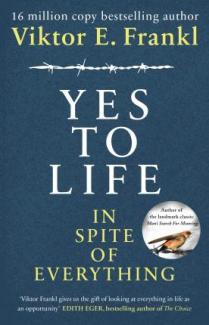
Rajeev K. Gupta reviews holocaust survivor and renowned psychotherapist Viktor E. Frankl’s book, ‘Yes to Life in spite of Everything’, a book that carries valuable lessons on life and how to live it. Rajeev lives with Parkinson's Disease.
The Meaning of Life
I read Viktor E Frankl’s ‘Man’s Search for Meaning’ decades ago, in the 1980s, and have been recommending it since then to all my friends who appear as serious readers. Discovered this book ‘Yes To Life In Spite Of Everything’ from the same author only a few weeks back and what a discovery it was! I have already read the book twice. It is a book that has to be read slowly and every line to be savored. It gets you in a contemplative mood when you just want to close the book and internalize what you read. Yet you realize that the message can’t be delivered in simpler words; one must read it in the right mood and the right frame of mind. Just don’t practice your rapid reading skills on this book.
Frankl is a holocaust survivor who spent more than four years in concentration camps. The book is a compilation of three lectures he gave a few months after his release from Auschwitz in 1946. All his immediate family perished in the camps. Frankl himself was dealing with survivor’s guilt and depression at the time of delivering these lectures. Yet you do not find any rancor or angst in his writing, only hope and positivity. A renowned psychotherapist, he finds his life’s meaning in his profession. He makes it his life’s mission to help others find a meaning in their lives irrespective of how mundane it appears to them. “Whoever has a why to live can bear almost any how”, he quotes Nietzsche.
Every single life, including those of terminally ill or mentally ill people, is meaningful in its own unique way, he argues, as every human being is unique and irreplaceable. He says that our lives take on meaning through our actions, through loving, and through suffering. Yes, suffering too is meaningful as “How we deal with the tough parts of our lives”, he observes, “shows who we are.” “If we can’t change our fate, at least we can accept it, adapt, and possibly undergo inner growth even in the midst of troubles.” “There is no predicament which cannot be ennobled either by an achievement or by endurance.”, he quotes Goethe.
If pleasure were the only purpose of life, he argues, people would not have voluntarily sought suffering as, for example, in the case of athletes who keep pushing the limits of their bodies in pursuit of higher goals. Pleasure, in itself, cannot give our existence meaning; thus, the lack of pleasure cannot take away meaning from life.
Frankl asserts that even the lives of terminally ill people who are in the last stages of their illness, are meaningful as every single human being is irreplaceable and inimitable, and that is true for everyone. “What is human is still valid. …….no human suffering can be compared to anyone else’s because it is part of the nature of suffering that it is the suffering of a particular person, that it is his or her own suffering…”
He exhorts people to become role models through their own exemplary actions rather than keep lecturing about it. He says, “…… as soon as we notice any pedagogical tendency in a role model, we become resentful; we human beings do not like to be lectured to like children……it is far more important than writing books or giving lectures: that each of us actualizes the content in our own act of being. “ (Reminded me of Gandhi ‘my life is my message’)
Asking people to take responsibility of their own actions and their own lives, he says, “Responsibility is something one is both ‘drawn to’ and ‘withdraws from’. This wisdom in the language indicates that there are opposing forces in human beings that prevent them from taking responsibility.
….it is difficult not only to recognize responsibility but also to commit to it. To say yes to it, and to life. “
“There is something terrible about the responsibility of a human being – and at the same time something glorious!” he says.
He quotes Tagore…
I slept and dreamt
that life was joy.
I awoke and saw
that life was duty.
I worked – and behold,
duty was joy.
I loved his quotes on life in general and am trying to follow these dictums:
“Life is not something, it is the opportunity for something!
the question can no longer be: ‘What can I expect from life?’ but can now only be: ‘What does life expect of me?’ What task in life is waiting for me?
it is not we who are permitted to ask about the meaning of life, it is life that asks the questions, directs questions at us – we are the ones who are questioned! We are the ones who must answer.”
He concludes by saying,
“We should not keep doubting the meaningfulness of life as Doubt about the meaningfulness of human existence can easily lead to despair. …..I realize that life is so infinitely meaningful that even in suffering and even in failure there still has to be a meaning.”
And finally:
“To say yes to life is not only meaningful under all circumstances – because life itself is – but it is also possible under all circumstances.”






